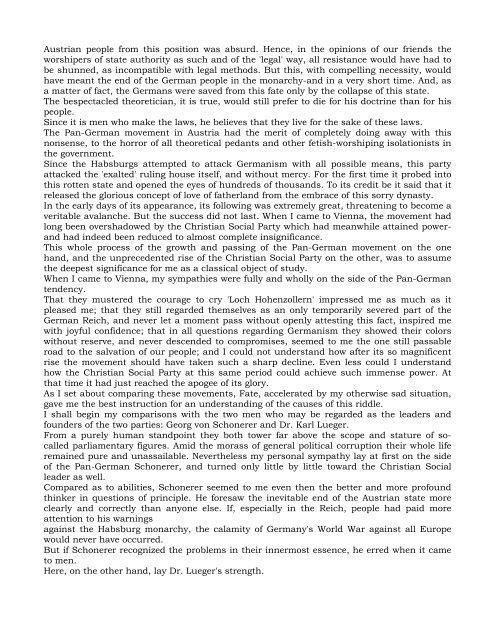Mein Kampf by Adolf Hitler
Mein Kampf by Adolf Hitler
Mein Kampf by Adolf Hitler
- TAGS
- kampf
- adolf
- hitler
- stuff2share.com
Create successful ePaper yourself
Turn your PDF publications into a flip-book with our unique Google optimized e-Paper software.
Austrian people from this position was absurd. Hence, in the opinions of our friends the<br />
worshipers of state authority as such and of the 'legal' way, all resistance would have had to<br />
be shunned, as incompatible with legal methods. But this, with compelling necessity, would<br />
have meant the end of the German people in the monarchy-and in a very short time. And, as<br />
a matter of fact, the Germans were saved from this fate only <strong>by</strong> the collapse of this state.<br />
The bespectacled theoretician, it is true, would still prefer to die for his doctrine than for his<br />
people.<br />
Since it is men who make the laws, he believes that they live for the sake of these laws.<br />
The Pan-German movement in Austria had the merit of completely doing away with this<br />
nonsense, to the horror of all theoretical pedants and other fetish-worshiping isolationists in<br />
the government.<br />
Since the Habsburgs attempted to attack Germanism with all possible means, this party<br />
attacked the 'exalted' ruling house itself, and without mercy. For the first time it probed into<br />
this rotten state and opened the eyes of hundreds of thousands. To its credit be it said that it<br />
released the glorious concept of love of fatherland from the embrace of this sorry dynasty.<br />
In the early days of its appearance, its following was extremely great, threatening to become a<br />
veritable avalanche. But the success did not last. When I came to Vienna, the movement had<br />
long been overshadowed <strong>by</strong> the Christian Social Party which had meanwhile attained powerand<br />
had indeed been reduced to almost complete insignificance.<br />
This whole process of the growth and passing of the Pan-German movement on the one<br />
hand, and the unprecedented rise of the Christian Social Party on the other, was to assume<br />
the deepest significance for me as a classical object of study.<br />
When I came to Vienna, my sympathies were fully and wholly on the side of the Pan-German<br />
tendency.<br />
That they mustered the courage to cry 'Loch Hohenzollern' impressed me as much as it<br />
pleased me; that they still regarded themselves as an only temporarily severed part of the<br />
German Reich, and never let a moment pass without openly attesting this fact, inspired me<br />
with joyful confidence; that in all questions regarding Germanism they showed their colors<br />
without reserve, and never descended to compromises, seemed to me the one still passable<br />
road to the salvation of our people; and I could not understand how after its so magnificent<br />
rise the movement should have taken such a sharp decline. Even less could I understand<br />
how the Christian Social Party at this same period could achieve such immense power. At<br />
that time it had just reached the apogee of its glory.<br />
As I set about comparing these movements, Fate, accelerated <strong>by</strong> my otherwise sad situation,<br />
gave me the best instruction for an understanding of the causes of this riddle.<br />
I shall begin my comparisons with the two men who may be regarded as the leaders and<br />
founders of the two parties: Georg von Schonerer and Dr. Karl Lueger.<br />
From a purely human standpoint they both tower far above the scope and stature of socalled<br />
parliamentary figures. Amid the morass of general political corruption their whole life<br />
remained pure and unassailable. Nevertheless my personal sympathy lay at first on the side<br />
of the Pan-German Schonerer, and turned only little <strong>by</strong> little toward the Christian Social<br />
leader as well.<br />
Compared as to abilities, Schonerer seemed to me even then the better and more profound<br />
thinker in questions of principle. He foresaw the inevitable end of the Austrian state more<br />
clearly and correctly than anyone else. If, especially in the Reich, people had paid more<br />
attention to his warnings<br />
against the Habsburg monarchy, the calamity of Germany's World War against all Europe<br />
would never have occurred.<br />
But if Schonerer recognized the problems in their innermost essence, he erred when it came<br />
to men.<br />
Here, on the other hand, lay Dr. Lueger's strength.


